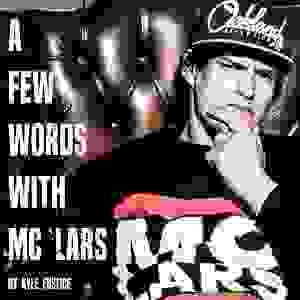
A Few Words with MC Lars
By Rapstation Editor for Rapstation.com
A Few Words with MC Lars
In 2003, MC Lars, the self-described "post-punk laptop rapper" went overseas to further study literature at Oxford University and also learned to embrace the nerd inside of him. To his surprise, the punk rock and hardcore bands he was hanging out with at the time were fascinated by the rap he was making so he decided to pursue it with all the fervor he could muster. While bands like Fugazi, Minor Threat and Dead Kennedys have played a major role in his particular style, the foundation for his brand of hip-hop is more in tune with classic literature and Lars's cerebral muscle. From Shakespeare and Edgar Allen Poe to Jack Kerouac and Herman Melville, he's rapped about subjects most emcees wouldn't dream of tackling. His most recent offering, Zombie Dinosaur, has plenty of intelligent lyrics for his fans to dissect, a result of endless hours of research. He released his first album, Nothing to Fear in 1999 and followed up with 2000's Insectivorous, but it was 2011's Lars Attacks! and 2012's Edgar Allan Poe EP that really seemed to get him noticed on a larger scale. Soon he was working with some of his hip-hop heroes, including KRS-One and Kool Keith, and opening up for major artists like Nas and Snoop Dogg. MC Lars took a few minutes to talk about it all.
RAPstation (Kyle Eustice): How do you write your songs?
MC Lars: For the Jack Kerouac song I did on the new album ["Forgot About Jack"], I read most of his work and his biography. I think that's important. It's so easy to do a cursory Wikipedia overview of a topic and write about the funny stuff. The English major in me always wants me to do deep research if I'm writing about something. Luckily, that's enjoyable to me.
What drew you to Shakespeare?
I feel like I struck a chord with the literature world in 1998. I was a sophomore in high school and we read Macbeth. The assignment for that English class was to reinterpret Macbeth in a new way. I was very enamored with how the witches had this iambic pentameter: "double, double, toil and trouble; fire burn and caldron bubble." The chanting was like a creepy song. Shakespeare kind of had a cadence that was a dominant poetic form in pop music. I was into bands like Bloodhound Gang and other bands that had put out songs with a similar flow.
You went to Oxford and Stanford, but what kind of grades were you getting? You could have been an F student [laughs].
I was a solid B student. I could have put more effort into my classes, but I was doing the rap hardcore [laughs].
What keeps you going?
There are so many people rapping and it's such a hustle to try to get noticed, but real and authentic stuff rises. I just stuck with it and it kept paying the bills. Who knows where I'll be in 10 years, but it's been an amazing decade.
How do you stay grounded?
I rap about literature so I make sure I have time to read, time in nature away from computer screens or iPhones and time to travel, that place where I can just be a human being. Rappers are constantly self-promoting—and I'm guilty of this myself—constantly trying to hustle and network, yadda yadda yadda, so you need time away from being a rapper to be a rapper.
What do you love about doing what you do?
Hip-hop culture is one of youth culture. It's experimental and there's a zen realization, purity of expression. I love working with young people. They keep me updated on what the zeitgeist of the culture is and who they're listening to. Also, I love their enthusiasm and unbridled energy. If you want to keep your skills you have to connect to the younger generation. "Nerdcore" rappers talk about how hip-hop sucks. It's not that it sucks, you just need to be able to relate to young people to get it. It constantly changes.
What is your Plan B if rapping doesn't work out?
I want to get accredited and become a therapist to use music to help kids deal with emotional growth and stuff like that. I always want to use music in other creative ways.